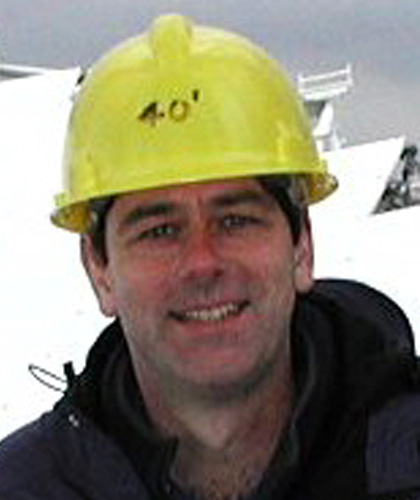
Harris, Andrew
Electrical and Computer Engineering
BACKGROUND
Andrew Harris is a Professor in the Department of Astronomy at the University of Maryland. His main research interests center around understanding the dense molecular and atomic gas that form the molecular clouds that provide the material for new stars in the nuclei and disks of of galaxies. Observations of this material traces the history of star formation over the history of the Universe, from the first massive galaxies to form, some 11 billion years ago, to the stars forming now in our own Galaxy.
A powerful tool for the study of molecular clouds is spectroscopy of molecular rotational and atomic fine-structure spectral lines at millimeter and submillimeter frequencies, from a few tens of gigahertz to a few terahertz. For many radio astronomical observations at these high frequencies, sensitive instruments with the tuning range and bandwidth must be constructed for specific experiments. Prof. Harris has built and spectrometer systems and installed them on many radio telescopes. His current instrumentation projects include a wideband spectrometer to search for spectral lines from galaxies at high redshift, collaboration with Prof. Shuvra Bhattacharyya's DSPCAD group in ECE, includes spectrometer systems for pulsar observations, wideband correlators for imaging the Cosmic Microwave Background, and microwave signal transport interconnect systems for millimeter-wave focal plane arrays. His laboratory in the Department of Astronomy supports these efforts.
In addition to using instruments developed in his laboratory, often in collaboration with other groups, Prof. Harris uses the CARMA millimeter-wave array in the high desert of California's Inyo mountains, an aperture synthesis millimeter wave array operated by a consortium of universities including the University of Maryland. Signals from CARMA's 23 antennas are combined to synthesize an equivalent telescope with size up to a few kilometers, allowing a view of the millimeter wave sky with unprecedented detail. Prof. Harris is also a member of the scientific team working with the Herschel Space Telescope, a European Space Agency submillimeter observatory with NASA participation.
Prof. Harris received a BSEE from the University of California, Davis, and a Ph.D. in Physics from the University of California, Berkeley in 1986. After a brief postdoctoral position in Berkeley he moved to the Max Planck Institute for Extraterrestrial Physics near Munich, Germany, eventually becoming a member of the permanent staff. He joined the Department of Astronomy at the University of Massachusetts, Amherst in 1994, then joined the University of Maryland in 1997.